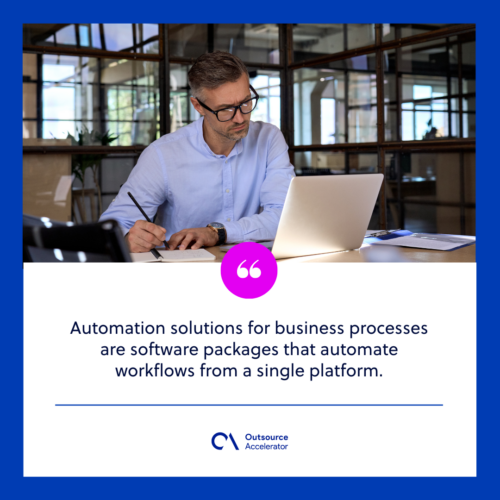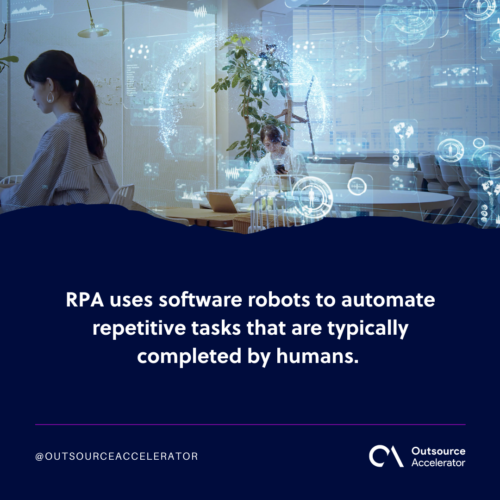Achieving efficiency and growth through automation solutions

The business landscape is fast-paced, and organizations are looking for whatever advantage they can get to move ahead of their competitors.
One powerful tool that’s been empowering businesses is automation solutions. Automation has revolutionized the way companies operate by streamlining processes to transform businesses.
Automation solutions for business processes
Automation solutions are one of the latest trends in business process management (BPM). With the arrival of AI, there is a rampant discussion about what applications it brings to the workplace.
Automation solutions for business processes are software packages that automate workflows from a single platform. They can be used by firms like Sourcefit to streamline repetitive tasks, monitor data, and improve productivity.
When it comes to business processes, there are two categories of automation solutions:
- Internal business process automation – Involves sales and marketing, finance, accounting, and HR.
- External business process automation – Includes order management, supply chain management, and logistics.

How do automation solutions work?
Automation solutions automate or semi-automate tasks like data entry, document retrieval, and file processing. The software can perform these tasks at the click of a button or in response to an event (like when you receive a new email, for example).
Automation solutions typically consist of three components:
- User interface – Allows you to configure how the application should respond to specific circumstances.
- Engine – Performs the actual work required by the user interface.
- Scheduler – Determines when specific actions take place.
A useful feature of automation solutions is that many are designed to be modular. Users can choose what they need and add on later if necessary.
This allows them to grow their business as they expand into new areas over time while keeping costs low.
Types of business automation solutions
There are different types of automation solutions that you can apply to your business, depending on the scale.
These include the following:
Task automation
Task automation automates a series of steps to complete a job. It can include anything from simple keyboard shortcuts to complex AI processes. Task automation reduces the time it takes to do work and improves efficiency.
Within business, task automation is used to schedule recurring tasks so that the same steps are taken each time the task is needed.
Workflow automation
This type of automation solution creates workflows from a combination of repetitive tasks. The workflow can be structured as a sequence of steps or activities. Each step is triggered by an event in the previous one.
Automated workflows are rule-based operations that can be run across multiple platforms, systems, and devices.
Process automation
Process automation solutions involve automating entire processes or departments within your company. This reduces human error, eliminates repetitive tasks, and cuts costs.
The term “process” can mean anything within your work style. It could include a simple task like opening an email and responding to a customer inquiry to something more complex like creating invoices or managing inventory.
Intelligent automation
Intelligent automation solutions make heavy use of artificial intelligence (AI) to mimic human decision-making processes. This method uses algorithms that can learn from past events and predict future outcomes based on those experiences.
The automation learns as it progresses, giving you higher accuracy and efficiency each time.
Robotic process automation
Another automation solution that heavily relies on AI, robotic process automation is frequently confused with intelligent automation.
RPA uses software robots to automate repetitive tasks that are typically completed by humans. The software robots mimic the actions of human users, like accessing applications through automated mouse and keyboard functions.
Unlike intelligent automation solutions, RPA is not programmed to adapt over time. It’s functionally more similar to machine learning than adaptive AI.

Benefits of automation solutions for your business
Automation solutions come with a bundle of benefits for improving business operations in your organization. Take a look at some of them below:
Increased productivity and efficiency
Automation solutions often involve using software or hardware to perform tasks automatically. This means that employees don’t have to spend time on menial tasks, so they have more time for more important work.
Automated processes also mean that your staff will be able to complete tasks at a faster pace than before. This can translate to increased productivity for your organization as a whole.
This is also brought up in Hubstaff’s BPO Executive Playbook. Automation becomes a winning advantage when used to augment your employees’ skills further.
CEO Jared Brown says that “The future of BPO success lies in transforming routine operations into opportunities for strategic growth. Automation isn’t just about efficiency—it’s the key to unlocking innovation and delivering unmatched client value.”
Cost savings
Firms that implement automation solutions often experience significant improvements in operational efficiency and accuracy. This leads to lowered costs in employee turnover, training, and lost productivity resulting from errors.
A company’s IT department may also be able to lower its IT operating budget by having the software manage more tasks.
Improved accuracy and consistency
Alongside the topic of improved accuracy, consistency is another benefit that you can get from automation solutions. Inaccuracies are common in human-based processes, but computer programming greatly reduces mistakes.
The predictability of automation solutions allows companies to measure performance and make adjustments when necessary easily.
Enhanced scalability
Automation solutions allow businesses to handle increasing demand without adding additional staff or infrastructure. Businesses that operate in multiple locations can easily scale up or down based on demand.
Better customer experience
Automation solutions are primarily designed to make life easier. Customers value brands that provide great experiences because it makes them feel special when they visit the business.
Automated solutions free up your employees from tedious tasks so they can focus on providing better customer service. Your customers will notice this and appreciate it.
Data-driven decision making
With automation solutions in place, you’ll have access to more data than before. This feature gives you a better idea of what’s working and what isn’t.
You can then use that information to make better decisions about strategies and tactics moving forward.
Competitive advantage
Finally, automation solutions give you a competitive edge over other brands. You can leverage technology to gain an advantage in growth without adding additional expenses.
By automating the tasks holding you back, your team can focus their resources on innovation and creativity.







 Independent
Independent




